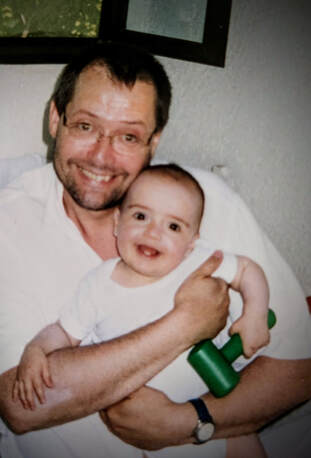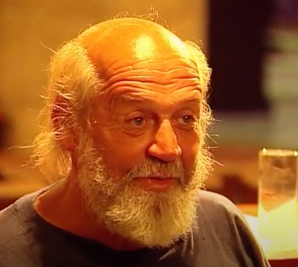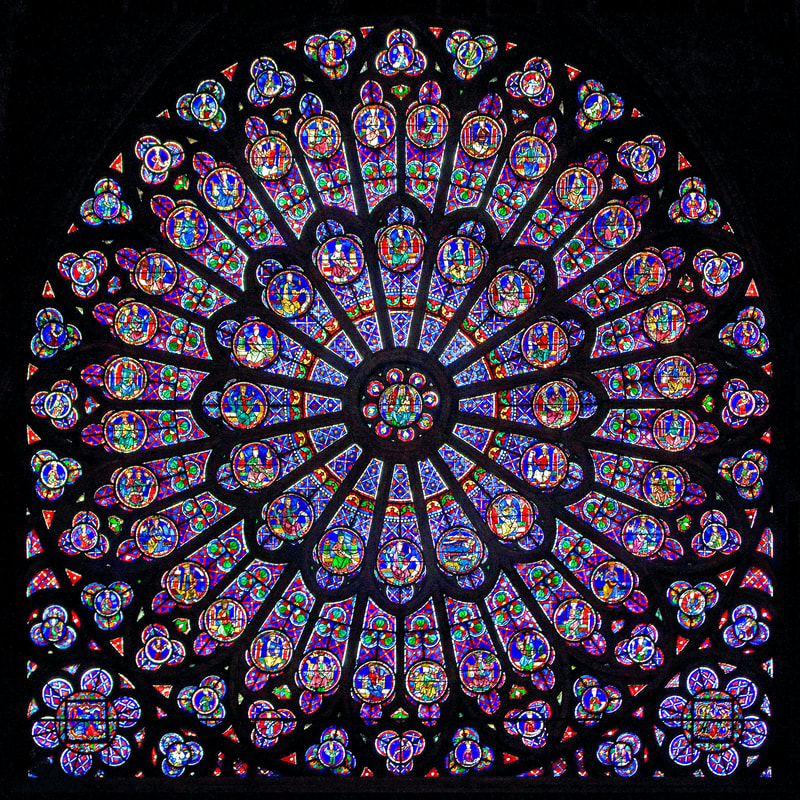My father was living in an isolated wooden house in a forest in Sweden. I hitch-hiked to Denmark in two days, sleeping rough. There was no bridge then so I took the ferry. The people were well dressed. I felt out of place. The border police in Sweden did not want to let me in. I did not have enough money. I eventually persuaded them that I was visiting family. I saw myself through their eyes: hairy, scruffy, poor and probably a bit smelly. What did I have to offer? I wouldn’t have wanted me in my country either.
It was cold and snowing. I got a train from the port to a town in central Sweden. My father picked me up at the station in a beaten-up old Volkswagen beetle. I recall that he drove with what seemed to me like extraordinary courage straight into sheets of white driving snow, every now and then stopping to clear a new porthole in the packed ice that was building up on the window screen.
I do not have pictures from that time but there is a documentary about my father made in 1998 for Swedish TV that can still be found on You Tube: https://youtu.be/EkwUTKkvefk. He hit the news in Sweden when, in a pre-published act of vandalism, he smashed a bank window with a hammer. It was a protest against what he called the debt-based money system. He went to jail. The film is about his walk from Uppsala to Cape town. ‘For Love not Debt’ was the slogan written on a flag that he stuck to the little pram he pushed in front of him all the way.
At one point, in a spirt of openness and honesty, I shared with him that I was not happy that he had abandoned my mother and me when I was still a baby. He did not respond well. Perhaps it was too much to expect an apology, but I did expect some acknowledgement of my feelings. Instead, he stormed around the house ranting. A bit like the snorting bull in my dream. He told me, quoting the bible, that I was supposed to respect my father, and that if I could not love him then I could not love God. I remained calm. Analysing our conversations that night I recognised a theme. He was the saviour. I was, at best, his assistant. He was so trapped in his own narrative, a narrative in which he played the starring role, that he was unable to care about my well-being or indeed that of anyone.
This was a major turning point in my life. Deep in my guts I felt the pure fire of righteous anger. If I was a failure, it was because of him. With no father around to love me and to guide me into a useful role within society, of course I had failed to thrive. Believing in him and his main message, that the whole system is irredeemably corrupt, had made it hard for me to create any life of my own. All that I was now offered in return for this loss and this sacrifice was a lack of respect and perhaps a vague role as one of his many followers. He was not the only one to blame, I realised. I also blamed all the misguided people who supported him, encouraging his grandiosity.
Previously I had seen him as an admirable man, a man of unusual integrity standing up for morality and for truth at great personal cost in the context of a dishonest and unjust system. Now I saw a petulant boy playing the role of a great man to fool himself as much as his audience. Unable to cope with reality he had created a dream in which reality was evil and he was a prophet crying in the wilderness, holding out for a new dawn. Instead of growing up and coming to terms with his own limitations and the imperfections of the world he had retreated into myth. Fighting the great beast. Saving the planet.
I left the next day smiling and apparently on good terms. I had achieved exactly what I had come for. Clarity. Outwardly I was polite. Inwardly the fire of anger had turned to contempt. I could see no point in any further engagement. The best I could hope for now was to avoid feeling the need to spit on his grave. On the train back to the port, with sunlight streaming through the window, I felt new, like a weight had been lifted. My father had asked me to choose between him and the beast. I chose me. If that meant joining the beast then so be it. I decided to stop drifting, stay in one place and build something. I took out my map of Europe, closed my eyes and stabbed my knife somewhere in England. The point landed near Bristol. Soon I was there, staying on a floor at first, then moving into a rented room. I got a temping job with references that I faked. I applied to Bristol university to do a Post Graduate Certificate of Education (PGCE) and was accepted.
Over that summer I worked clearing invasive plants and dangerous rocks from the cliffs around Cheddar Gorge. I was fit and tanned – the best job ever. It was so good that I deferred my entry to university. Clearly, I still struggled a bit with the project of ‘going straight’. As the days drew in and it got colder the outdoor job was less fun. I switched to working nights in a call centre. Lonely I attended meetings of the Quakers or the Religious Society of Friends. Some seem to think that religion is about ‘belief’ but I found little interest in beliefs here, more a focus on experience and people engaging profoundly with the question of how to live, sharing their insights and struggles. Amongst the quakers I found role-models working constructively within the system as social entrepreneurs and professionals yet feeling able to combine this with a spiritual worldview. The PGCE gave me academic references. It was followed by a masters in computing in London and then a PhD in Educational Technology at the Open University. I did not abandon all that I had learnt from my time as an itinerant spiritual seeker but I cautiously embraced the system. And I loved it. It was fun to earn money and buy experiences, participating in the collective dream. Ten years after that encounter with my father in a hut in the forests of Sweden I was a properly employed professional with a doctorate, a mortgage and a car. Later that year, 1998, I married a wonderful woman in the Quaker meeting house in Milton Keynes. Everyone we knew and worked with was invited to the party in the old church on the grounds of the Open University campus. Guests provided the food, the drink and music. Within a year we had a son.
It was not easy to change my life around. I still got odd twinges prompting me to ‘fight the power’, be a hero, save the planet etc. but, having learnt how not to be a human being from the example of my father, I treated these urges with suspicion. Instead of big causes and moral abstractions I focussed most of my passion on those closest to me. I loved (almost) everything about being a father and being a husband, teaching my son how to skim stones in the river, shopping in local markets with my wife, going to the family pub on Sunday and watching our son play with the other kids while we ate too much and drank warm beer. Just like everybody else. Bringing my son up with all the structure, security, love and careful guidance that I did not have was a journey of personal healing and redemption for me. In being his dad, it was as if I was going back in time and being the dad to myself that I had so desperately needed.
I am not saying that my father was a bad person. I have a limited view. Many found him inspiring. Talking with him when I was younger helped me learn to think more critically and more deeply about everything. My feelings remain ambivalent. After all, who does not want to smash a bank window with a hammer and walk to Africa? But mostly what I learnt from him was not to trust people who talk big about morality whilst failing to look after those near them. Of course, it is good to criticise bad things with a view to making them better but I am suspicious of the motives of those who, like my father, seem to gain energy from condemning ‘the system’ as a whole, without apparently feeling any obligation to offer a workable alternative. Wandering on the margins of society I met quite a few troubled young people who, like myself at that time, seemed to prefer fantasies about an imminent apocalypse or revolution to the more complex and slow business of building the kind of life that provides nourishment. In the context of our history, any ‘system’ that enables at least some families to bring up children in peace seems to me to be already quite a big achievement; an achievement not to be thrown away lightly. Ordinary life turned out to be the miracle that I had been searching for all along. Despite appearances, despite all the conflict, frustration and confusion, I find the world to be wonderful just the way that it is.
All manner of thing shall be well
When the tongues of flames are in-folded
Into the crowned knot of fire
And the fire and the rose are one.
The last words from T. S. Eliot's Four Quartets



 RSS Feed
RSS Feed